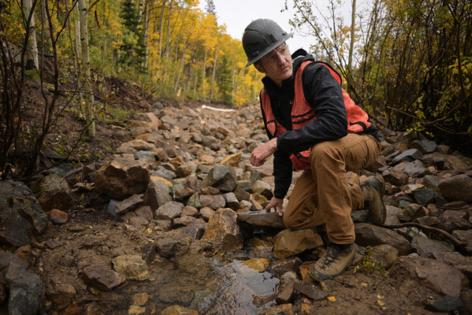New law could finally address thousands of abandoned mines leaking pollution into Colorado water
Published in News & Features
DENVER — A new law decades in the making could finally lead to the cleanup of some of the thousands of abandoned mines in Colorado that leak toxic metals and acid into the headwaters of the rivers that sustain life across the West.
The Good Samaritan Remediation of Abandoned Hardrock Mines Act, signed into law by President Joe Biden on Dec. 19, is the first step in removing burdensome legal liabilities for groups and state governments that volunteer to clean up abandoned mines and improve water quality.
“It’s a huge milestone and arguably one of the most important environmental laws to pass in decades,” said Ty Churchwell, mining coordinator with Trout Unlimited, who has worked for more than two decades to create better policy for abandoned mine cleanup
Hundreds of thousands of abandoned mines across the West leak acidic drainage and toxic dissolved metals into streams that provide drinking water, recreation and critical wildlife habitat. But groups that want to clean up the sites have been stymied by environmental protection laws that required them to take on so much legal liability that the risk outweighed the benefit.
A site can only be eligible for the new pilot program created by the law if nobody is available to be held accountable for the original mining and pollution. Many sites across Colorado’s mineral belt stopped production before regulations were created to hold miners responsible for environmental degradation, leaving abandoned sites across the state.
The pilot program allows nonprofits, state agencies and others to clean up abandoned mine sites without the burdensome level of liability. The U.S. Environmental Protection Agency has 180 days to stand up the program, which will then evaluate proposed sites for cleanup and choose 15.
Before the law, groups that wanted to clean up old mine sites — so-called “Good Samaritans” — could end up with permanent responsibility and liability for the preexisting pollution at a site under two of the country’s landmark environmental protection laws: Superfund and the Clean Water Act.
Several sites in Colorado would fit well with the pilot program, said Jason Willis, director of Trout Unlimited’s Western Abandoned Mine Lands Program.
More than 23,000 abandoned mines dot public and private land in Colorado and at least 500 of them measurably harm water quality, according to the Colorado Division of Reclamation, Mining and Safety.
Although the bill passed with bipartisan support from lawmakers across the country, it took 25 years to develop consensus around what the program should look like. Both of Colorado’s senators as well as five of the state’s House representatives supported the bill. The law is common sense, said Sen. Michael Bennet, who has introduced multiple versions of the bill over the last 12 years.
“Thousands of abandoned mines pollute our ecosystems and threaten our watersheds in Colorado and across the West,” Bennet said in a statement after the bill’s passage. “This bill will make it easier for our state, local governments and nonprofits to clean up these mines, reduce pollution and improve water quality.
The pilot program will last seven years, after which Congress will have to consider creating a permanent program, Churchwell said. If everything goes well with the pilot, there will be data to show the worth of creating a permanent program, he said.
“The idea with this bill is to prove up the program,” he said.
As abandoned mine cleanup progresses, policymakers, nonprofit leaders and communities will need to find the money to complete the projects, Willis said. Cleaning up all the leaking mines in the U.S. could cost upward of $50 billion, according to an estimate from Trout Unlimited.
Future iterations of the law could include a component that allows companies to reclaim and sell critical minerals from the acid mine drainage, said Molly Morgan, a doctoral candidate at the Colorado School of Mines studying critical mineral recovery from mine drainage. The money could then be used to offset remediation costs and create a financial incentive for cleaning up more abandoned mines.
“I really think we’re being shortsighted as a country if we don’t see this as an opportunity,” she said.
The pilot program is a phenomenal first step to solving a pervasive problem across the West, she said.
“I think this has been a really long time coming,” Morgan said. “This bill is the product of massive compromise.”
©2025 MediaNews Group, Inc. Visit at denverpost.com. Distributed by Tribune Content Agency, LLC.







Comments